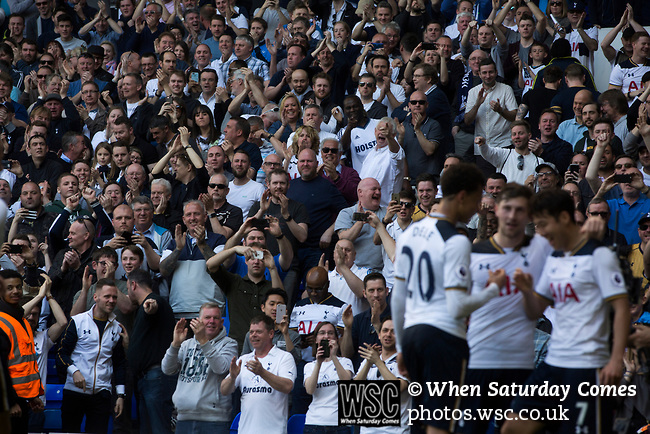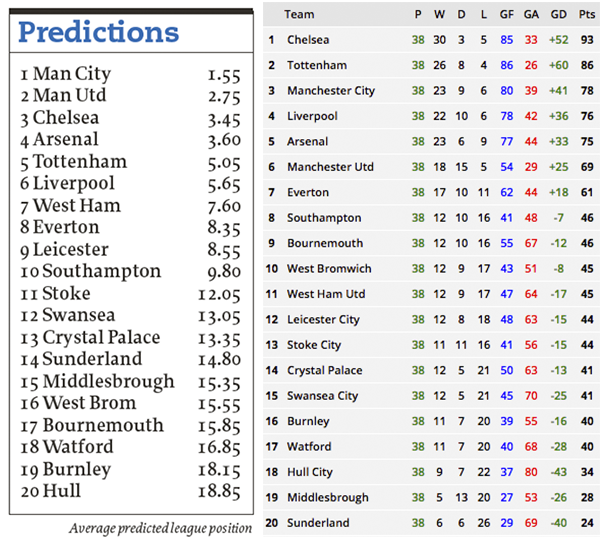Chelsea surprise seemingly everyone at the top as the José Mourinho v Pep Guardiola battle fails to materialise – what WSC contributors got right and wrong last season
28 July ~ Unlike in every other division during 2016-17, our contributors did not manage to pick out the Premier League title winners. It was Chelsea, tenth the previous season as Leicester ran out champions, who recovered to comfortably win the League.
Chelsea’s season was even a surprise to David Hearn, who thought it was “pretty hard to say” how they would do “until we know which Chelsea are turning up this season”, before predicting a top-five finish. Antonio Conte’s team led the division for the majority of the season, wrapping up the title with a 1-0 win against West Brom on May 12.
Our contributors’ pick for the title were Manchester City, with the arrival of Pep Guardiola as manager presumably influencing a few opinions. Ian Farrell wasn’t so confident, however. “Obviously we have a fantastic manager,” he said, “but one facing a very different type of challenge than at Bayern or Barça. A lot will depend on how much he can resist engaging with José Mourinho and Zlatan Ibrahimovic.”
It all started so well with six wins in a row but they couldn’t keep up the form and it wasn’t their neighbours that did the damage to City’s title challenge. Instead they suffered an inconsistent season which included defeats against Spurs, Chelsea (twice), Leicester and Liverpool, as well as a 4-0 defeat against Everton.
At Old Trafford, our contributors had expected Mourinho to face off against, and just miss out to, Guardiola in the race for the Premier League. Joyce Woolridge had different, slightly more accurate expectations: “We’ve got Mou; they’ve got Pep. Manchester will surely see a titanic struggle – for the final Champions League place. Top four?”
It was Guardiola who won out in the battle for the Champions League places as Manchester United drew their way sixth, but Mourinho found his own way to qualification, winning the Europa League to ensure a spot in the Champions League group stages. There they will join runners-up Tottenham, who had a better season than most expected, including Luke Chapman. “Top six(ish),” he said. “Last season the squad significantly overachieved and it will be hard to repeat.” In fact that went one better than their third place in 2015-16, while also finishing above Arsenal for the first time in 22 years.

Jon Spurling said it was “hard to see Arsenal involved in anything other than a struggle for fourth place” and he proved to be correct – though for once the Gunners missed out on Champions League qualification. They finished fifth, one point behind a Liverpool team who Rob Hughes described as having “the mental fortitude of a soggy paper bag”. Still, Rob expected them to be pushing for the top four and that’s what they achieved.
The defending champions Leicester were again unpredictable. “I genuinely have no idea what will happen,” said Foxes fan Simon Tyres. “It could just as easily be another high-achieving year establishing the club’s development or a severe case of second-season syndrome.” For much of the campaign it looked like the latter, with Leicester in danger of relegation until an upturn in form under new manager Craig Shakespeare following Claudio Ranieri’s sacking in February. They did, however, reach the Champions League quarter-finals.
At the other end of the table Matthew Rudd was expecting “a horrible, acrimonious season-long scrap” for Hull City. “As usual under the dreadful Allams, we have minimal stability,” he said. The rest of the division’s contributors agreed, placing them bottom. Despite City putting up slightly more of a fight than Matthew expected, with Marco Silva replacing Mike Phelan as manager in January, they were relegated on May 14 after a 4-0 defeat away to Crystal Palace.
Watford and Burnley were expected to join Hull in the Championship next season but scraped together enough points for survival – much to the relief of Hornets fan Kevin Wright (“If we can integrate the new coach and players then we can comfortably finish lower mid-table, if not then we can look forward to the relegation battle everyone predicted last season”) and Burnley’s Kevin Clarke (“At best 17th or 16th”).
Taking their places in the relegation zone were two clubs from the north-east. Ed Upright was relatively optimistic about Sunderland’s chances, suggesting that “David Moyes should break the 40-point mark for the first time since 2012 and we’ll survive for an 11th consecutive Premier League season. It’s a golden age for SAFC, apparently.” Finally, though, the Mackems succumbed to the drop, having failed to register a win until November. They ended up 16 shy of that 40-point marker.
Thirty miles south Middlesbrough’s Harry Pearson was excited for their Premier League return. “The signing of Álvaro Negredo has brought back memories of the old Fabrizio Ravanelli days, but since Aitor Karanka is a whole lot better at organising a defence than Bryan Robson it hopefully won’t end as disastrously as that did. Fifteenth.” While Negredo was top scorer with ten goals, it ended worse. Boro managed just 28 points and Karanka was gone in March.
Elsewhere West Ham could not provide the Champions League push Mark Segal was hoping for following their move to the Olympic Stadium, initially struggling in their new home before finishing 11th. All Simon Melville wanted from Bournemouth was “a slight improvement on last season’s 16th and a good cup run”. They couldn’t provide the latter, but Eddie Howe did lead them to ninth place – not bad considering they were widely expected to spend the season in a relegation battle.

WSC 367 with the 2017-18 season guide is in shops on Thursday, August 3. Subscribe here to get it delivered to your door.
Photo by Colin McPherson/WSC Photos: Spurs fans celebrate their team’s third goal against Watford
Actual table provided by Soccerstats.com